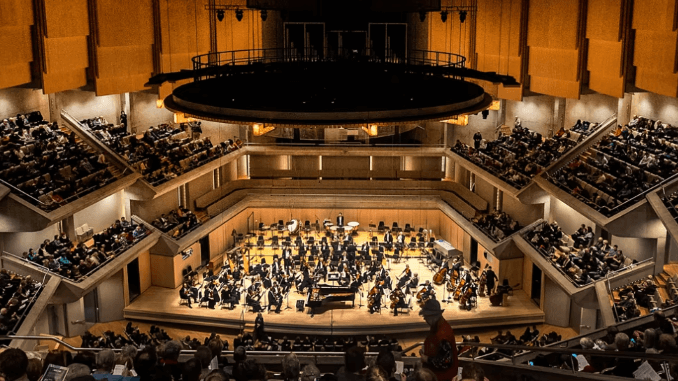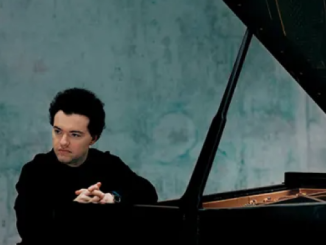In last year’s Academy Award-nominated Tár, the swirling personal and professional crises of its title character, a world-renowned (fictitious) conductor, all come to a head during a live recording of Mahler’s Fifth Symphony. This epic, extraordinary music – itself composed at a time of great personal and professional turmoil in the life of the composer – forms the backdrop for Todd Field’s excellent, psychologically penetrating film, easily one of the best ever made about classical music. (Hilary and Jackie is up there too, though it lacks Tár‘s eye for the details of the classical music world, how musicians tick, how music is actually rehearsed and performed.)
Inherently cinematic – the Fifth’s famous “Adagietto” was previously (over)used and widely popularized by Luchino Visconti’s 1971 film of Death in Venice – the symphony proves an ideal fit for the world crafted by Field and his star Cate Blanchett (who spent months studying with Australian conductor Natalie Murray Beale to prepare for her role as Lydia Tár).

All of which is to say, the Toronto Symphony Orchestra’s recent performance of Mahler’s Symphony No. 5 (1902) could not have come at a better time. Though Tár sadly did not take home any gold at last month’s Oscars ceremony, the brief flurry of media coverage surrounding the film, focussed in part on the authenticity of its musical performances, has drawn renewed attention to this greatest of works in the classical repertoire. Is Mahler No. 5 the best Mahler symphony? Perhaps. Is it one of the most essential, must-see live compositions in the entire history of classical music? Absolutely.
Guest conductor John Storgårds acquitted himself admirably with a score that many conductors – Tár and Leonard Bernstein among them – have considered the Everest of their respective careers. Storgårds’s fine, controlled conducting brought out the best in the TSO, which for the past decade has been slowly making its way through all nine symphonies. (Next year, they turn to Mahler’s monumental Third Symphony, which features a full choir alongside an expanded symphony orchestra.)
Despite its epic, eighty minute duration (nearly twice that of Beethoven’s Fifth, for those who count this sort of thing), at no point did the TSO’s performance drag or otherwise lose the audience’s attention. From the opening trumpet solo of the Trauermarsch (Funeral March) – here performed, correctly, onstage, whereas Tár had the idiosyncratic touch of placing the trumpeter offstage, as in other Mahler symphonies – through the closing Finale, the TSO’s performance was arguably the highlight of the Toronto spring classical season.
And then, of course, there’s the Adagietto. In isolation – as in its use in the Visconti film – it is a work of sublime beauty. In context, where you can hear the little hints of it build over the forty or so minutes of the first three movements before it arrives, and then echoing afterwards through the finale, it is even more impressive. I actually find it quite difficult to write about the Adagietto, twelve minutes of musical perfection so extraordinary that we risk burying it under the weight of superlatives, so all I will say is that the TSO got it right.
If I have one criticism of the evening, it was the inclusion of a full half-hour’s worth of pre-intermission programming featuring North American premieres of the late Joonas Kokkonen’s Adagio Religioso (1991) and Scottish Composer Helen Grime’s Violin Concerto (2016).
Not only did this cause the concert to run long, but a work like the Fifth, in my view, requires the undivided attention of the listener. Although Grime’s violin concerto is actually quite exciting, and Kokkonen’s string-heavy, lyrical Adagio rather beautiful, both were completely overshadowed by the masterwork that came in the second part of the program. I’ve attended Mahler performances where it was just the symphony and nothing else – while it might lose the TSO some intermission drink-and-snacks money, I wouldn’t mind if they embraced that approach once in a while.
***
For TSO tickets and to see the full concert calendar, click here.



